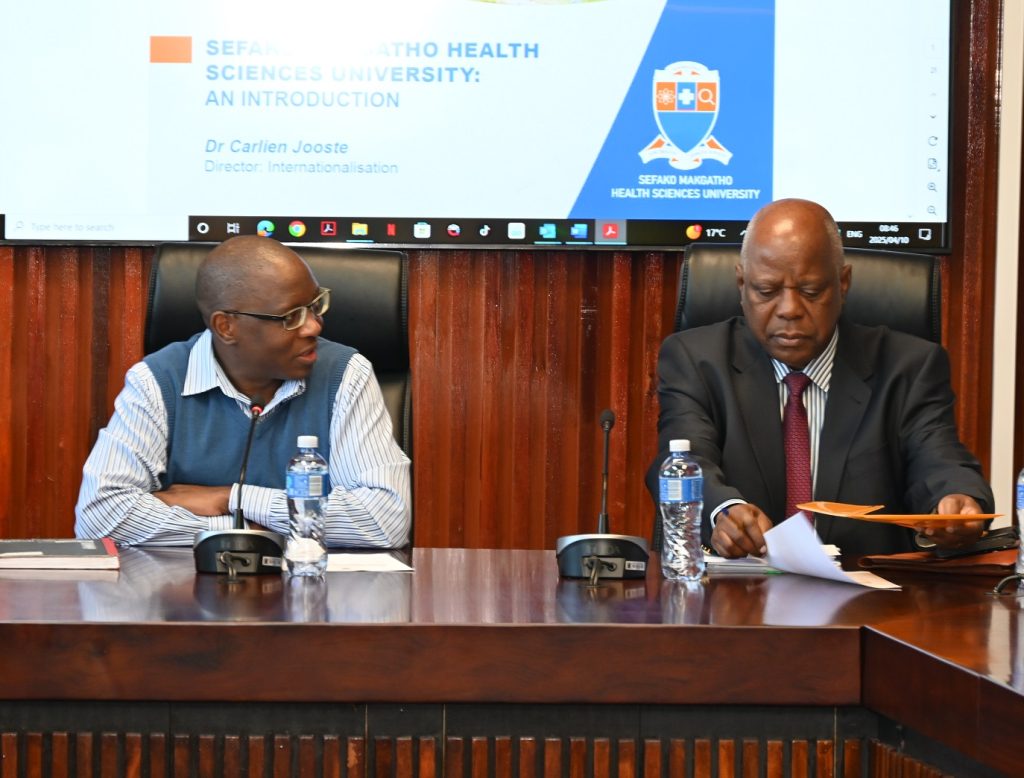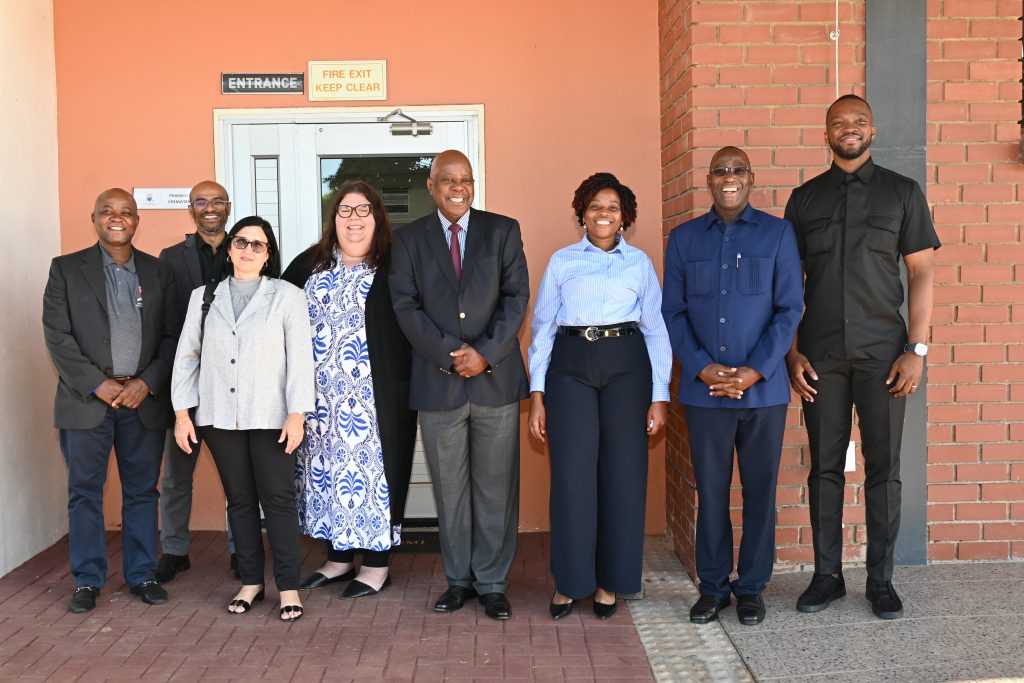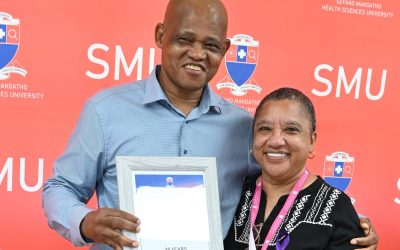Sefako Makgatho Health Sciences University (SMU) recently welcomed a delegation from Mozambique’s Universidade Wutivi (UniTiva), led by its Chancellor, Professor Domingos Tivane, for a high-level benchmarking visit. The visit focused on exploring best practices across SMU’s flagship academic programmes in medicine, pharmacy, hospital management, nursing and midwifery, and clinical psychology.
 The day commenced with a warm welcome from Dr Jeffrey Mabelebele, Acting Deputy Vice-Chancellor: Teaching, Learning and Community Engagement, who emphasised the spirit of collaboration between the two institutions. “We are honoured to host Professor Tivane and the UniTiva delegation. This is an opportunity not only to showcase our strengths but also to learn from one another and build sustainable academic partnerships,” said Mabelebele.
The day commenced with a warm welcome from Dr Jeffrey Mabelebele, Acting Deputy Vice-Chancellor: Teaching, Learning and Community Engagement, who emphasised the spirit of collaboration between the two institutions. “We are honoured to host Professor Tivane and the UniTiva delegation. This is an opportunity not only to showcase our strengths but also to learn from one another and build sustainable academic partnerships,” said Mabelebele.
Dr Carlien Jooste, Director of Internationalisation, provided an overview of SMU’s institutional footprint and introduced the South African Policy Framework for the Internationalisation of Higher Education as the basis for the visit. Professor Tivane responded by reaffirming the purpose of the engagement.
“We are here to learn, to be inspired, and to build bridges between our institutions,” he said. “UniTiva is looking to enhance its own health sciences training, specifically Medicine, which will commence in July 2025, and SMU, with its track record of academic excellence, is the ideal institution to benchmark against.”
An insightful overview of the School of Medicine’s curriculum and operations was delivered by Gerda Botha and Professor Honey Mabuza, followed by a session on best practices per year level in the Bachelor of Medicine and Bachelor of Surgery (MBChB) programme. Notable contributors included Dr Edwin Seleka (MBChB I) and Professor Robert Ndou (MBChB II), with further input from Professor Honey Mabuza on undergraduate research and Thokozile Kgongwane on Interprofessional Education and Collaborative Practice (IPECP).
 “Our fourth-year students are publishing in accredited academic journals, which speaks to the quality and impact of our undergraduate research training,” noted Mabuza. Professor Lesiba Baloyi was joined by colleagues Prof Mokoena Maepa and Maryke Pierce to discuss the University’s clinical psychology programme and their African-focused approach in SMU’s highly competitive postgraduate clinical psychology programme.
“Our fourth-year students are publishing in accredited academic journals, which speaks to the quality and impact of our undergraduate research training,” noted Mabuza. Professor Lesiba Baloyi was joined by colleagues Prof Mokoena Maepa and Maryke Pierce to discuss the University’s clinical psychology programme and their African-focused approach in SMU’s highly competitive postgraduate clinical psychology programme.
Thokozile Kgongwane, along with Skills Centre Director, Dr Lesego Phiri, then led the delegation on a hands-on tour of the SMU Skills Centre, offering a glimpse into simulation-based teaching and the university’s commitment to experiential learning.
The afternoon sessions focused on Nursing and Midwifery, Hospital Management and Pharmacy, where Dr Madan Poka outlined innovative teaching methods, student support, and community engagement initiatives.
“This visit is not just about showing what we do, but how we do it—our pedagogy, our partnerships, and our passion,” Dr Poka, Acting Dean of Pharmacy, observed.
Professor Sogo Matlala, Dr Andile Mokoena-De Beer, and Kgomotso Mabasa presented best practices in nursing, midwifery and hospital management. These included competency-based education aligned with the South African Nursing Council’s R174 regulations, incorporating rigorous objective structured clinical examinations (OSCEs), a 50% pass mark threshold, and 2,120 supervised clinical hours across key disciplines—closely aligned with international standards set by the United Kingdom’s Nursing and Midwifery Council (NMC) and European Union (EU) directives.
SMU’s unique IPECP programmes are redefining healthcare education through interprofessional collaboration, shared values, and ethical practice. The programme aligns with global frameworks from the World Health Organization (WHO) and the International Council of Nurses while maintaining a strong local impact.
“Our IPECP model improves patient outcomes, reduces duplication of resources, and supports our graduates to thrive in multidisciplinary teams,” noted Kgongwane.
Dr Jooste stressed that any Memorandum of Understanding (MoU) developed must be “intentional, mutually beneficial, and active.” A lively discussion on the potential MoU followed, setting the tone for future collaborations and an invitation for SMU delegates to visit UniTiva.
The day concluded with a tour of the School of Pharmacy laboratories and reflections on SMU’s continuous quality improvement efforts. These include quarterly academic review meetings, internal and external moderation processes, peer reviews, and student feedback loops that inform module planning and redesign.
SMU’s commitment to innovation was also on full display, from hybrid and flipped-classroom models to the integration of 3D-printed anatomical structures and dispensing software in Pharmacy education. The institution’s research-integrated curriculum prepares students for evidence-based practice, lifelong learning, and global competitiveness.
“We pride ourselves on excellence, innovation, and relevance. This benchmarking visit confirms that we are on the right track in shaping Africa’s next generation of healthcare professionals,” concluded Jooste.
SMU continues to set the pace in health sciences education across the continent, with international visits such as this reaffirming its role as a beacon of health care sciences academic excellence and societal impact.
By Tumelo Moila



